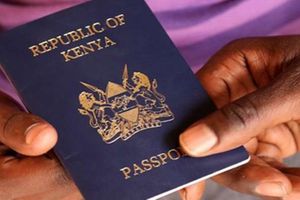On the path towards gender equality

Women buying fish from fisherman. Women still do a lot of work to ensure their families have something to eat. PHOTO | FILE
What you need to know:
Tanzania Media Women Association (Tamwa) executive director Rose Reuben says they expect the country to invest in women and girls because they are the part development.
This year March 8, Tanzania is going to join other countries in the world to celebrate the International Women’s Day with global theme “An equal world is an enabled world”. The day will be commemorated by women from various sectors gathering together to discuss and portray different messages and activities.
Tanzania’s theme will be “the generation of equality for Tanzania’s present and future development.”
The day will offer an opportunity to reflect on progress made, to call for change and to celebrate acts of courage and determination by ordinary women who have played an extraordinary role in the history of country and communities.
However, as the country celebrate the IWD, there will be also a review of 25 years since the world signed the Beijing Declaration and Platform for Action (BPfA) and at the time the global community will be marking 5th Anniversary of Agenda 2030 for Sustainable Development. The two commitments provide a framework for achievement of irreversible and measurable progress towards gender equality and women’s empowerment without leaving anyone behind.
The review to be held between March 9 and 20 in New York will bring several African heads of states representatives including Tanzania, to discuss the review, appraisal of the implementation of Beijing Declaration Platform for Action.
To ensure women hold senior leadership positions, women who spoke to Woman said that the government should invest in women and girls to develop the country.
Tanzania Media Women Association (Tamwa) executive director Rose Reuben says they expect the country to invest in women and girls because they are the part development.
“If the country will focus on economic empowerment it will set a direct path towards gender equality to eradicate poverty and inclusive economic growth,” she said.
According to her, women make huge contributions to the economy of the country whether in businesses, on farms, entrepreneurships, employees, leadership or doing unpaid care work at home unfortunately, they remain extremely affected by poverty, discriminated and exploited.
“The government has made progress on several issues to eliminate violence against women, increase number women leadership but a lot more was still needed to be done,” she said.
Dr Reuben stressed that gender discrimination limits access to economic assets such as land and loans, limits participation in shaping the economy and social policies.
“This year Form Four exams saw number of girls attaining good marks in their final exams but, most of them who passed with flying colours are those with parents capable to send children in private schools,” she said.
She noted that as they were going to mark 25 of Beijing declaration, they expect women to contest for several leadership posts instead of waiting to be appointed or be given special seats because if they are appointed it becomes difficult for them to make decisions and manage things on their own.
She further explained number of women in senior leadership was not bad but, more women need to vie for the positions.
She urged women not to sit back as relax for government officials to appoint them for special seats….. “As we mark 25 years of Beijing Declaration, we also expect women in constituency to go for leadership positions.”
Ms Magreth Chilumba said though she was not aware about the Beijing declaration review, when it comes to gender issues, women are the most affected compared to men.
The resident of Ubungo Kibangu explained that women spend more time doing household responsibilities than men. In particular they have primary responsibities, for instance in areas with water challenges they take the task of water collection and firewood.
“For instance, in the village I come from in Mtwara, health facilities have been improved than it was in the past, so far the government has done a tremendous job,” she said.
Despite, such efforts some women speak about the achievements made by Tanzania and several African countries, though a lot is needed to be done to enable women and girls attain their dreams.
African Women’s Development and Communication Network (Femnet) executive director Ms Memory Kachambwa told Woman that resourcing feminism policies and rights that would help people with disabilities, children, youth and women should be a priority for Africa to progress.
According to her, African Head of States should adopt feminism policies to help improve gender equality and Sexual Reproductive Health and Rights SRHR) related issues.
She further said the government should consider providing microfinances loans with small interest lending rates to women because most of them do not have own big businesses to enable them pay back with high interest rate.
According to her, a lot of declarations and ratifications have been signed but not much has changed about women as most African countries still face challenge of early marriages, rape, sexual violence against girls and women were still high. Ms Kachambwa stressed that this year would will be the launch of new decade 2020/30 for African heads of states to make commitments on Sustainable Development Goals (SDGs).
“We expect issues that affect girls, and women would be included....issues related to micro- lending funding, policies climate, gender, disability and diversity would be prioritized,” she said.
She said that Sweden, Canada and France are the only countries that adopted feminism policies and for a long time these countries have become champions of gender equality domestically and internationally regardless of political party in government.
In 2015, the Association of Tanzania workers (ATE) initiated a program dubbed “Female Future Tanzania” to support women in leadership after discovering that only 35 per cent of women in the country hold senior leadership positions.
The program run in collaboration with the Eastern and Southern Africa Management Institution and help women climb the ranks in business or politics by offering them the kind of leadership training they would have trouble accessing on their own.
The BPfA underscores commitment made at global, regional and sub regional levels to ending discrimination, promoting women’s rights and advancing gender equality and women’s empowerment. The review will include an assessment of current challenges that affect the implementation of the Platform for Action and the achievement of gender equality and the empowerment of women and its contribution towards the full realization of the 2030 Agenda for Sustainable Development.




